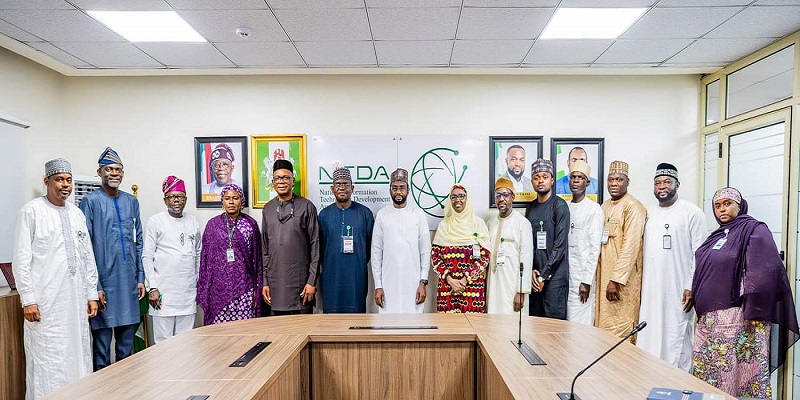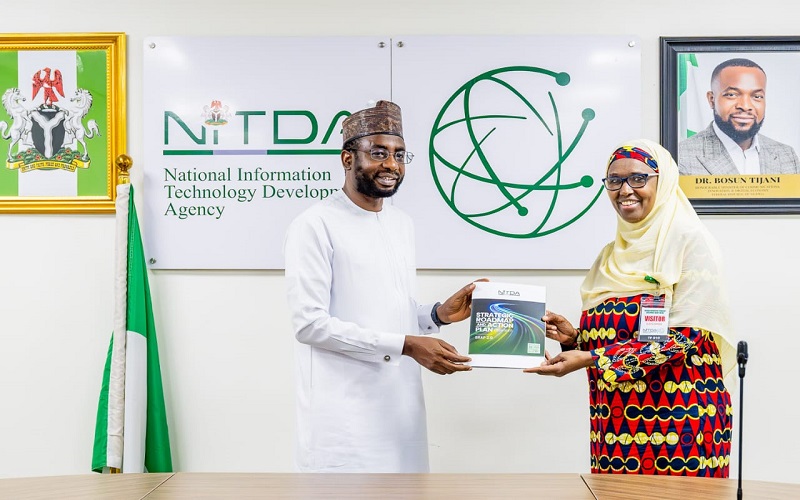NITDA’s DG Harps On The Need To Integrate Technology In Healthcare Delivery
In the news:
- NITDA is partnering with ACEPHAP to improve Nigeria’s healthcare through technology.
- Collaboration aligns with presidential priorities in education, health, and social investment.
- Agency investing in AI, IoT, and blockchain to drive innovation.
The National Information Technology Development Agency (NITDA) has expressed its readiness to collaborate with the Africa Centre of Excellence for Population Health and Policy (ACEPHAP) in transforming healthcare delivery in Nigeria through technological innovations.
Digital TimesNG reports that this is part of the Agency’s continued effort to implement the presidential priority areas, particularly focusing on Education, Health and Social Investment by strengthening their capacities through digital innovation and inclusive access to technology.
Director General of NITDA, Kashifu Inuwa disclosed this when a delegation from the ACEPHAP led by its director, Professor Hadiza Shehu Galadanci visited him at the Corporate Headquarters of the Agency to discuss possible areas of collaboration.
Inuwa outlined a comprehensive plan to leverage technology as an enabler across all critical sectors in Nigeria, with a particular focus on healthcare while emphasising that technology is not a standalone sector but an essential tool that enhances productivity and innovation across all sectors.
While enumerating the Agency’s pillars of its Strategic Roadmap and Action Plan (SRAP 2.0) in creating a thriving digital ecosystem that benefits all sectors, he stated that the administration of President Bola Ahmed Tinubu has prioritised healthcare by utilising technology to achieve significant development in the sector.

“Healthcare is key to us, and the President is also big and loud on it, so we have crafted our strategic roadmap and action plan which has 8 pillars to achieve significant milestones in the sector,” he noted.
He said that the agency has set an ambitious target of achieving 95% digital literacy by 2030 with a mid-term target of 70% by 2027 and has consequently rolled out the Digital Literacy for All programme which aims to infuse digital skills into the national academic curriculum in collaboration with the Ministry of Education.
He also noted additionally that there are plans to train 3 million Nigerians in high-demand IT skills through various initiatives including partnerships with platforms like Coursera.
Inuwa gave valuable insights on various strategic initiatives the agency has been implementing which the visitors can leverage to create a vibrant healthcare sector in alignment with the other SRAP pillars.
While noting that the agency is investing in the research of 6 emerging technologies: AI, IoT, Robotics, UAVs, Blockchain and Additive Manufacturing, he mentioned that the goal is to establish centres of excellence in geopolitical zones to foster innovation and collaboration.
“Based on that, we would do the site readiness assessment for the equipment you need, and you can do it for any or all of the identified emerging technologies with your focus on healthcare.
“Cyber security is critical to whatever you do because even the patients need to be sure of the integrity, availability and confidentiality of their information because as you digitise, you need to make sure their data are secured,” Inuwa said.
He also disclosed that through the Nigeria Startup Act, NITDA has been supporting startups with incentives and resources to foster innovation, adding that the Agency encourages startups to register and benefit from those initiatives to boost their growth and scalability.
Speaking on forging strategic partnerships and collaboration, he hinted that the Agency engages with academia, corporate organisations, entrepreneurs, venture capitalists and government entities to build a cohesive innovation ecosystem.
While noting that the collaboration between the two agencies is a transformative step in the right direction, Inuwa asserted that adoption of AI tools in enhancing medical research and diagnostics is an innovative approach towards transforming healthcare delivery in Nigeria.
He mentioned recent collaborations, such as with E-Health Africa, which utilises AI tools like ChatGPT to enhance medical research and diagnostics, noting that this innovative approach is part of a broader strategy to develop local AI-driven solutions that can transform healthcare delivery in Nigeria.
Earlier in her remark, Prof. Galadanci expressed optimism about the future while envisioning a long-lasting relationship with NITDA that will drive transformative change in the healthcare sector.
She shared success stories from the centre’s healthcare entrepreneurship boot camp and pitching event in 2023 where young innovators were identified in Kano and supported with seed grants to further develop their ideas.
Galadanci noted that the collaboration would translate research into impactful policies and foster a culture of innovation and entrepreneurship among students, faculty and healthcare professionals.
“We sincerely hope this will be the beginning of a long-lasting relationship and partnership that will translate to the true meaning of the quadruple helix in the quest to address the rights of healthcare challenges through technology, innovation and entrepreneurship in Nigeria and Africa,” she remarked.

